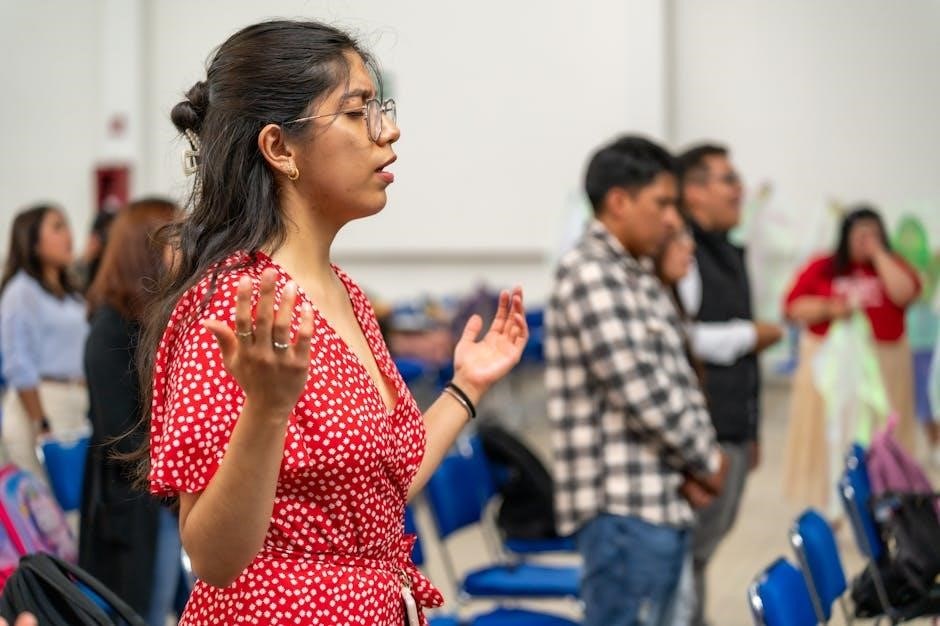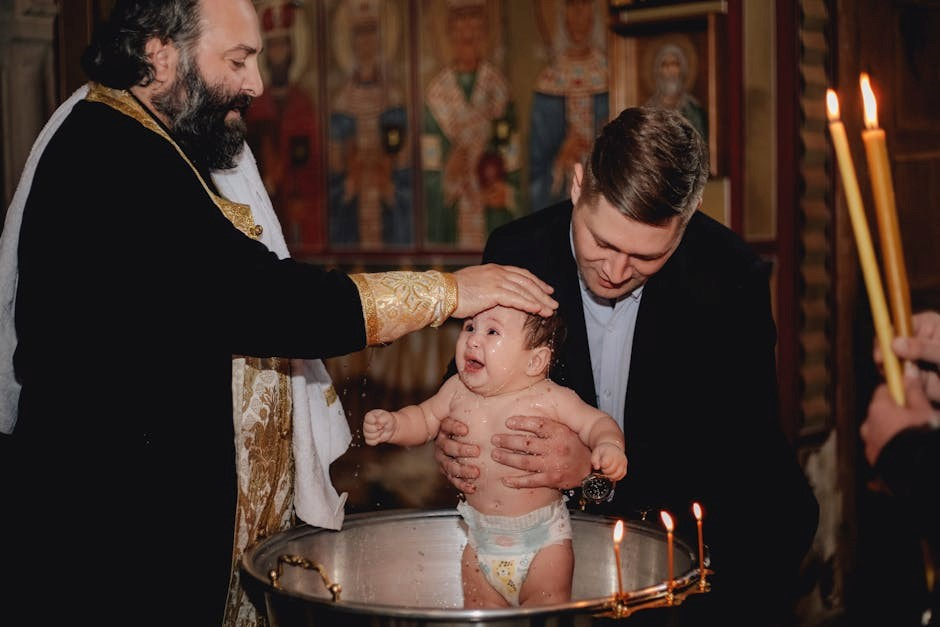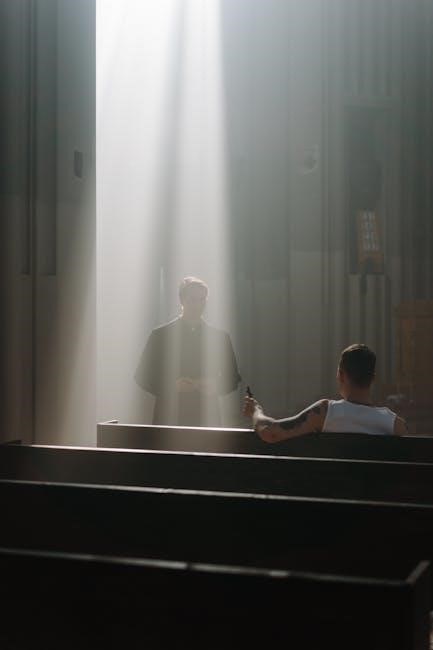The Rite of Christian Initiation of Adults (RCIA) is the official ritual text guiding the initiation of adults into the Catholic Church through stages of faith formation․
1․1 Overview of the RCIA Process
The RCIA process is a structured journey for adults seeking to join the Catholic Church, emphasizing spiritual growth and faith formation․ It begins with the Period of Inquiry, where individuals explore Catholic teachings․ This is followed by the Catechumenate, focusing on deeper faith understanding and community integration․ The Period of Enlightenment precedes the sacraments, offering reflection and purification․ Finally, Mystagogia guides new Catholics in living their faith post-initiation․ The process is flexible, adapting to individual readiness and liturgical timing, ensuring a comprehensive and transformative experience․
1․2 Purpose and Importance of the RCIA
The RCIA process is designed to guide adults in embracing the Catholic faith through a structured and transformative journey․ Its purpose is to foster spiritual growth, deepen understanding of Catholic teachings, and prepare individuals for full communion with the Church․ The importance lies in its ability to create a community of believers who are well-equipped to live out their faith actively․ By providing a comprehensive framework, RCIA ensures that new members are fully integrated into the life of the Church, enriching both the individual and the parish community․
Key Stages of the RCIA Process
The RCIA process includes distinct stages: Inquiry, Catechumenate, Enlightenment, and Mystagogia, each guiding adults through faith formation, spiritual growth, and full initiation into the Catholic Church․
2․1 The Period of Inquiry
The Period of Inquiry is the initial stage of the RCIA process, where individuals explore Catholic teachings and discern their call to join the Church․ It is a time of introduction to the faith, fostering curiosity and reflection․ During this informal phase, inquirers engage in discussions, ask questions, and share experiences, guided by the parish team․ This period emphasizes building a foundation of faith and community, preparing participants for the next stage of their spiritual journey․ The Rite of Acceptance marks the transition from Inquiry to the Catechumenate, formally welcoming them into the catechumenal process․
2․2 The Catechumenate
The Catechumenate is a period of deeper spiritual growth and faith formation for those who have moved beyond the initial inquiry phase․ It involves regular catechetical instruction, immersing participants in the teachings of the Catholic Church, and fostering a life of prayer and service․ This phase is marked by the celebration of the Rite of Acceptance, formally welcoming inquirers into the catechumenal process․ The focus is on nurturing a personal relationship with Christ, understanding Church doctrine, and experiencing the liturgical life of the community․ The Catechumenate concludes with the Rite of Election, preparing candidates for the sacraments of initiation․
2․3 The Period of Enlightenment
The Period of Enlightenment is the final stage before the celebration of the sacraments of initiation․ It is a time of intense prayer, reflection, and purification, focusing on enlightening the mind and heart․ This phase typically coincides with the Lenten season, emphasizing spiritual preparation․ The Rite of Election is celebrated during this period, marking the transition from catechumenate to the final preparations for Baptism, Confirmation, and Eucharist․ The enlightenment period deepens the understanding of God’s Word and strengthens the commitment to a life of faith, service, and discipleship within the Catholic Church․
2․4 Mystagogia
Mystagogia is the final stage of the RCIA process, occurring after the celebration of the sacraments of initiation․ It focuses on deepening the understanding of the mysteries experienced during Baptism, Confirmation, and the Eucharist․ This phase emphasizes the connection between faith and daily life, encouraging new Catholics to live their faith actively․ Through reflection, teaching, and community support, participants are guided to integrate their spiritual experiences into their lives․ Mystagogia fosters ongoing conversion and discipleship, helping individuals to grow in their relationship with Christ and to fully embrace their role in the Catholic Church․

The Role of the Priest in the RCIA Process
The priest plays a crucial role in the RCIA process by providing liturgical leadership and spiritual guidance to those journeying toward full initiation into the Catholic Church․
3․1 Liturgical Leadership
The priest provides liturgical leadership in the RCIA process by presiding over key rites, such as the Rite of Acceptance and the sacraments of initiation․ They ensure the liturgical integrity of each step, guiding the community in prayer and worship․ The priest’s role includes preparing and celebrating the Eucharist, which is central to the Mystagogia phase․ Their leadership helps the catechumens and candidates experience the Church’s liturgical life, fostering a deeper connection to the sacred mysteries․ This liturgical guidance is essential for the spiritual journey of those entering the Catholic faith;
3․2 Spiritual Guidance and Support
The priest plays a vital role in providing spiritual guidance and support throughout the RCIA process․ They help inquirers and catechumens deepen their faith through personal encounters, reflections, and prayer․ The priest collaborates with the RCIA team to address spiritual needs, offering insights and encouraging discernment․ This support is crucial during key moments, such as the Rite of Election and preparation for the sacraments․ By fostering a spiritual environment, the priest ensures that participants are well-prepared to embrace their new life in Christ and fully integrate into the Catholic Church․

The RCIA Manual and Its Structure
The RCIA Manual provides a structured approach to faith formation, organizing content into segments that guide participants through the initiation process systematically and effectively․
4․1 Content and Organization
The RCIA Manual is organized into systematic segments, providing a structured approach to faith formation․ It aligns with the Catechism of the Catholic Church, presenting teachings in a logical sequence․ The manual includes liturgical rites, prayers, and guidelines for each stage of the RCIA process․ Designed for adaptability, it allows parishes to tailor content to local needs while maintaining fidelity to Church doctrine․ The manual also includes practical resources for catechists and priests, ensuring a comprehensive and unified approach to initiating adults into the Catholic faith․
4․2 Practical Applications in Parishes
The RCIA Manual is tailored for practical use in parishes, offering adaptable resources to guide adult initiation․ It includes 21 structured segments aligned with the liturgical year, enabling parishes to customize content according to local needs․ The manual supports priests, catechists, and RCIA teams in facilitating weekly sessions, ensuring a comprehensive faith journey․ Its flexibility allows parishes to integrate the liturgical cycle, parish calendars, and the readiness of inquirers, making it a versatile tool for fostering spiritual growth and preparing adults for sacraments․

Celebrating the Sacraments of Initiation
The sacraments of Baptism, Confirmation, and Eucharist mark the culmination of the RCIA journey, fulfilling the initiate’s integration into the Catholic Church’s faith community․
5․1 Baptism, Confirmation, and Eucharist
The sacraments of Baptism, Confirmation, and Eucharist are the pinnacle of the RCIA journey, marking the initiate’s full incorporation into the Catholic Church․ Baptism cleanses the soul, imparting new life in Christ․ Confirmation strengthens the individual with the Holy Spirit, deepening their faith and commitment․ The Eucharist, the source and summit of Christian life, unites the initiate with Christ and the Church․ These sacraments are typically celebrated together during the Easter Vigil, symbolizing rebirth and illumination․ The celebration is a joyful moment for the entire parish, welcoming new members into the faith community․
5․2 The Rite of Acceptance and the Rite of Election
The Rite of Acceptance marks the transition from the Inquiry stage to the Catechumenate, where inquirers publicly express their intention to join the Catholic Church․ The Rite of Election occurs during Lent, formally enrolling catechumens and candidates in the Book of the Elect, signifying their readiness to receive the sacraments․ These rites emphasize the Church’s acceptance and recognition of their commitment, preparing them for the sacraments of initiation․ Both ceremonies highlight the spiritual journey and the community’s support, serving as pivotal moments of grace and formal recognition in the RCIA process․

The Role of the Parish RCIA Team
The Parish RCIA Team facilitates the initiation process by providing spiritual guidance, liturgical support, and educational resources, ensuring a comprehensive and nurturing environment for participants․
6․1 Responsibilities and Contributions
The Parish RCIA Team plays a vital role in supporting the initiation process․ Members contribute by leading catechetical sessions, providing spiritual guidance, and organizing liturgical rites․ They foster a welcoming community, ensuring participants feel supported throughout their journey․ The team collaborates with the priest to prepare for sacramental celebrations and offers individualized support to address participants’ needs․ Their efforts ensure a comprehensive and transformative experience, helping adults deepen their faith and integrate into the Church community․
6․2 Collaborative Ministry
Collaborative ministry is essential to the RCIA process, involving the Parish RCIA Team, priests, catechists, sponsors, and the wider parish community․ This shared effort ensures a comprehensive and supportive experience for participants․ The team works together to provide spiritual guidance, liturgical preparation, and faith formation, fostering a sense of belonging and accompaniment․ Each member contributes their unique gifts and expertise, creating a rich and transformative journey for those seeking to join the Church․ This collaborative approach reflects the Church’s communal nature and ensures the initiation process is both meaningful and effective․

